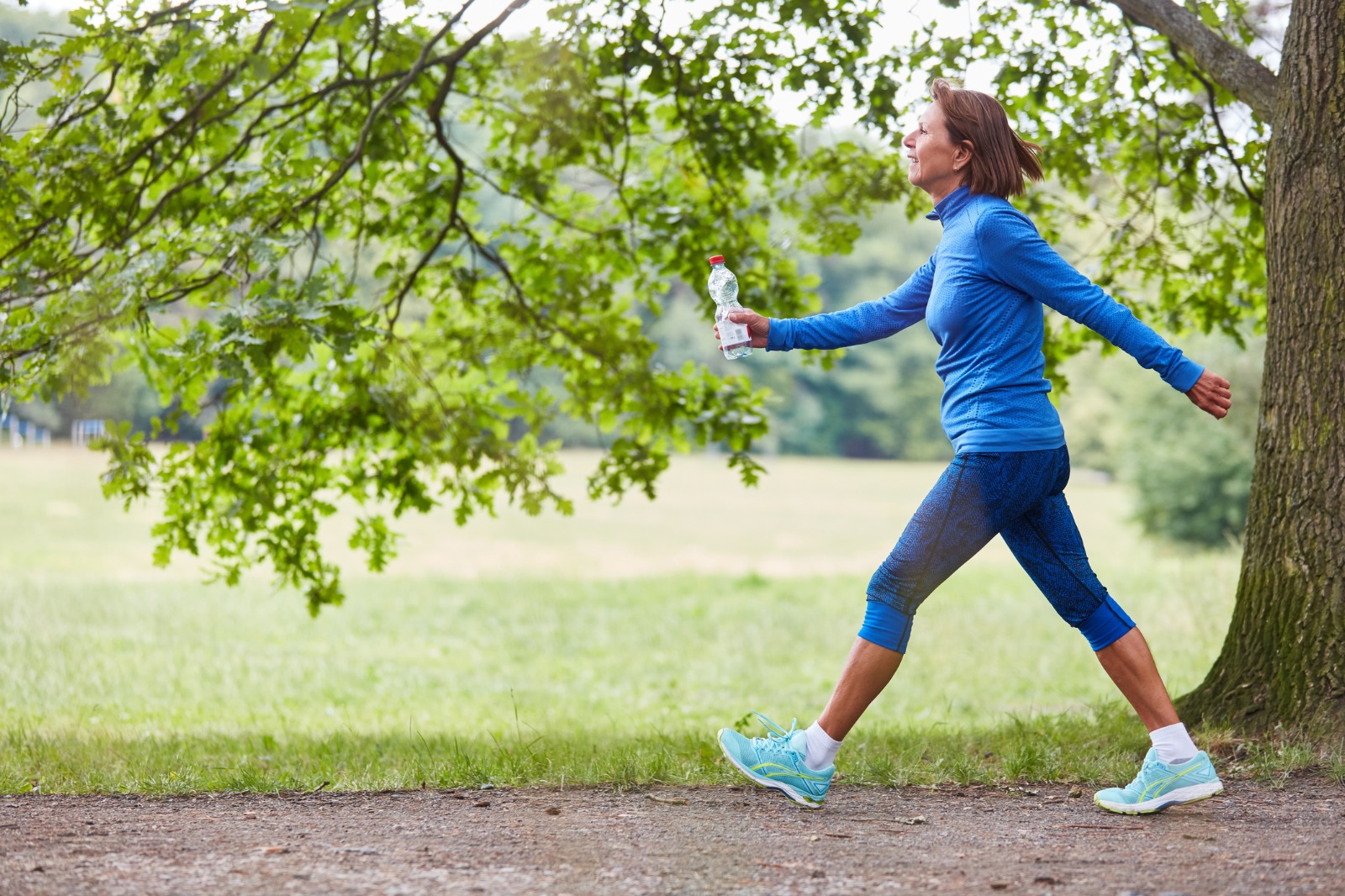
Walk your way to better health
Imagine the children of Israel walking through the wilderness for forty years. Forty years on their feet. How most of us hate the idea of walking! In the gospels Jesus and His disciples walked throughout His ministry. Jesus was always on the move, healing the sick and performing all sorts of miracles. Jesus and His disciples were physically well equipped for their reasonable service to God. Are you? Romans 12:1 advises us to present our bodies a living sacrifice to God, which is our reasonable service.
Does your busy schedule keep you trapped inside the house or the office? Do you know that sitting in front of the computer for hours or on your couch watching TV all day long deprives you of the optimum health God intended for you? Your body was created to move.
Most people spend their entire day on their butts which is detrimental to health. Our bodies were created to walk. Don’t you wonder why our biggest muscles are in the legs and thighs? Our bodies function better when we walk. Walking regularly protects our health spirit, soul, and body.
What are you battling with?
Fatigue, insulin resistance, diabetes 2, high blood pressure, arthritis, or brain fog? While some people blame God for their health issues, scripture tells us that God wants us healthy.
God wants you well. 3 John 2
- God loves you and His will is that you live a long healthy life. God values your body. He cares for spirit soul and body. he cares so much that He even catered for our physical needs, Genesis 1:28-31. Jesus Christ tells us in John 10:10 that He brought us abundant life
- He has provided everything you need for life and godliness (wholeness). 2 Peter 1:3
- God designed your body to heal itself if given the right provisions?
Well, one of those provisions is physical exercise. The simplest and most natural form of exercise is walking.
Some benefits of walking:
Walking improves circulation in the body
Walking is a simple, low-impact exercise that can help you create a more active and healthy lifestyle and may promote weight loss. Walking at any pace is beneficial to increase blood flow throughout the body, as it is the best way to lower your blood pressure and increase muscle contraction in the legs. As muscles contract and relax, they squeeze around the large veins in the legs, promoting healthy circulation in more stagnant areas of flow.
Walking increases oxygen and fresh air
It increases oxygen to the brain. Our cells and the brain need oxygen to function properly. Walking increases blood circulation by which oxygen and glucose go to the brain.
Walking may increase your vitamin D: Never miss a walk on a sunny day. The sun offers more natural vitamin D than most supplements on the market. Vitamin D protects the neurons in the brain and reduces inflammation. Be sure to protect yourself against excess heat
Walking helps you control your weight
Scientists have established that walking regularly is one way to lose weight. Maintaining a healthy weight is an effective way to lower the risk of developing cancer and other diseases. Walking for longer periods can be an effective way of losing weight. The first 30 minutes you burn off the sugar. Then you start burning the fat.
If you want to lose or control your weight, aim at getting healthy to lose weight. Your interest in physical fitness should not be motivated by the dictates of society or pride, but instead should be driven by the commitment to honor God with your body. Get in shape so that you are confident, healthy, and fit for His service.
1 Timothy 4:8 Paul that physical training has some value, but that training for godliness has greater value. Paul acknowledges that physical training is important but spiritual training is much more.
Boosts energy and reduces fatigue
- Walking increases oxygen flow through the body.
- It can also increase levels of energy elevating hormones such as epinephrine, and norepinephrine.
Walking helps in the removal of waste from our cells. Walking has a positive effect on all systems of the body improves circulation, digestion, the lymphatic system, elimination of waste
Walking mobilizes lymphatic system circulation. The lymphatic system has no pulp. It relies on movement for its motion.
Reduces joint pain: Walking can help protect the joints, including your knees and hips.
- Walking increases the synovial fluids in your joints. It helps lubricate the joints and strengthen the muscles that support the joints.
- Walking provides benefits for people with arthritis and inflammation. It increases natural pain killers (OPIOIDS).
- Walking protects against inflammation, which in turn reduces pain.
Walking strengthens the bones, especially in your legs.
Walking will reduce bone density loss as you age. Therefore, it improves bone density and risk of osteoporosis.
Walking strengthens muscles: foot, leg, thigh, muscles. It improves lumbar muscle function and stability for hips legs, back and neck.
Walking strengthens the heart
Walking is one of the best exercises for poor circulation. Walking can help form new blood vessels in the legs, which can ultimately improve blood flow as well as reduce pain for people with peripheral artery disease.
Walking decreases hypertension, reducing risks for heart attacks and strokes. Walking daily has been shown to increase good cholesterol and decrease bad cholesterol.
Walking at least 30 minutes a day, five days a week can reduce your risk for coronary heart disease, reduce pain of peripheral artery disease and more. The longer the distance the better the results.
Reduces stress and improves your mood, may reduce depression
Walking can help your mental and emotional health.
- It can help reduce anxiety, depression, and negative thoughts.
- Walking can boost self-esteem, improve your confidence, and reduce symptoms of social withdrawal.
Walking will help the brain produce neurotransmitters likeendorphins which stimulate relaxation and improve your mood. Endorphins can release stress and create a feeling of wellbeing. Prolonged stress can enhance the developing of physical problems such as inflammation, cancer, and heart disease.
Enjoy your walk with a belly of laughter. Proverbs 17:22 says: “A joyful heart is good medicine, but a crushed spirit dries up the bone.” Laughter releases endorphins and alters levels of hormones, serotonin, and dopamine.
Walking regularly will improve sleep
Fifty percent of people over age 65 suffer from chronic sleep problems. If you are among them, walking could be your answer to better quality sleep.
One of the main benefits of walking is reducing cortisol, which results in lower stress levels. This decreases your risk of anxiety, depression, and insomnia. Dew to the lower cortisol, high oxygen your sleep is improved.
Walking may reduce your risk to Alzheimer’s and dementia and keep you sharp as you grow older.
Boosts your immune function
Exercise plays a vital role in maintaining a healthy immune system. Reduces your risk for developing certain diseases Walking can help protect you during cold and flu season. Walking may help eliminate harmful substances, dead and damaged cells which promote inflammation, gut related issues, and cancer.
Boosts your mood and social life:
Apart from rebounding, cycling, and swimming, walking is one of the most convenient, easy to plan activities that can be enjoyed on your own or socially in groups-
Walking is a great family and friend activity. The release of endorphins improves your mood and increases the feeling of well being
Add years to your life. PIBTC Physical activity improves longevity:
Sedentary adults have higher risk for premature death, heart disease, stroke, diabetes, depression, and some cancers. A sturdy in BMJ, the British Journal for Sports Medicine, reported that walking at an average pace regularly, reduced risk of overall death by 20%. So, walking briskly, could extend your life.
https://bjsm.bmj.com/content/52/12/761
Despite all its benefits, walking on its own will not deliver all the essentials to protect your health. Make wise decisions by incorporating all the healthy practices, including good nutrition, physical exercise, quality sleep, stress management and above all fellowshiping and with our health mentor, the Holy Spirit.
Caution: I am not a fitness instructor. Make sure you get professional advice before you embark on any exercise.



